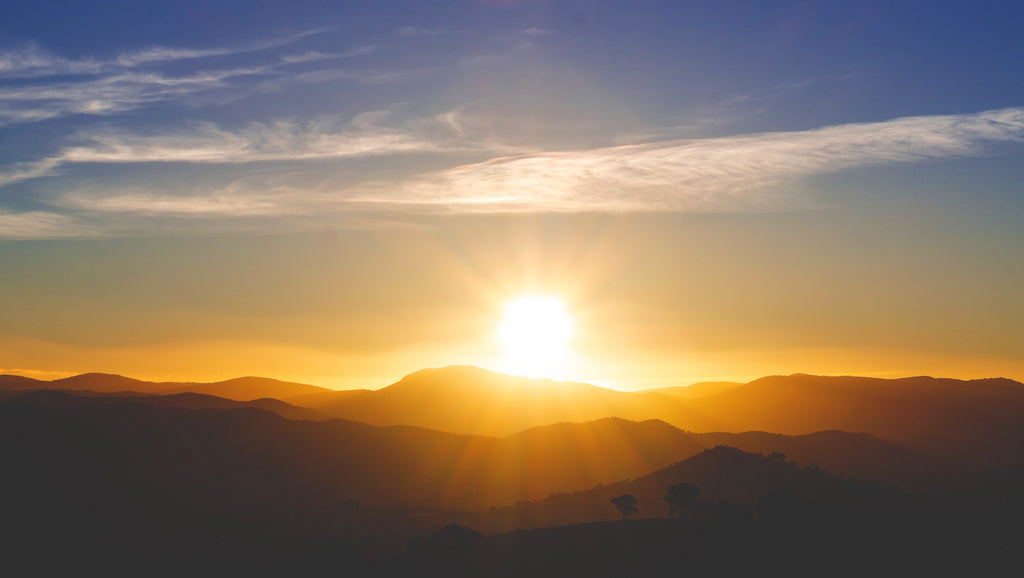As the sun rises, you start to feel your body move toward wakefulness even though you desperately need those extra few minutes to grab some snooze time. Your eyes flutter, you see the light just begin to creep in and you roll over, shut your eyes tight and talk yourself back into sleep. It’s not a very refreshing rest, even if you feel yourself going deep, so that when you awake, you feel groggy, out of sorts and, well, a little irritated.
Gentle Reader, we humans are hardwired for “up with the sun, down with the sunset” — literally. The more natural light you treat yourself to, the better you will actually rest in the evening. Light — certain kinds and times of light — is your friend. Strange, we know, considering all you hear about making your bedroom as dark as possible and losing all blue light distractions to get a good night’s rest. Remember, we said CERTAIN kinds and CERTAIN times, not all of either and herein lies the rub. And the info. And the story we are about to weave to make your sleep life that much better with a little help of song.
“Sunrise, sunset. Sunrise, sunset...”
Humans — you and I — are what are called “diurnal” beings. This means we evolved to sleep at night. When we say we’re literally hardwired for sunrise, sunset living, it’s because there are certain cells in our eyes that are directly connected to what is called the “master clock” in our brain. The rising of the sun, high noon or midday, and that great glowing orb sinking into the horizon are key touchpoints for our body. Those times of the earth’s rotation affect plants, animals and the entire human race. When we reach midpoint in our day and go out into the sun, it says to our brain, “Yo! Time to kick in that melatonin stuff, because it’s gonna be dark in a few hours and we need to get ready to snooze.” And — voila! — the mystical, magical melatonin starts doing its thing. Midday sunlight prompts that, meaning your body has a direct connection with nature beyond just being a carbon-based life-form.
“I’m walking on sunshine...”
Okay, so, that transition from light to dark tells our brains it’s time to get ready for bed just as the transition from dark to light lets our body know, “Wakey, wakey! Eggs and Bakey!” Mmm… eggs and bakey… While its power may be diminished on an overcast, gloomy day, the benefits are actually still there. The amount of lux — excuse us while we go technical/science-y for a moment — which is basically how intensely the human eye perceives light, may not be the same as full sun but it’s comparable. Walking in the rain at noon, going on a stroll in the snow, or just taking in the midday view of a grey day is still going to kickstart your melatonin production.Your energy and mood feel the benefits and get all bouncy and good, and that exposure to natural light does wonders for cognitive and physical tasks.
“When Sunny gets blue, her eyes get dark and cloudy...”
You’ve obviously discovered a theme here — natural light is preferable and truly does wonders for your mind, body, spirit and sleep. Artificial light, however, wreaks havoc on your body. For example, if you sleep with the lights on your body becomes confused. It thinks it’s still daytime although the illumination doesn’t have the lux — see? There it is again — of full sunlight or even a grey day. But your mind and body are cabobbled by it and that means your melatonin production is put at risk. They even say — and you know how THEY are — that keeping the lights on while you snooze decreases your melatonin levels by up to 85 percent. And, ya know? That’s a lot.
BLUE light is especially ill advised. Why? Well, although the color blue in natural or even artificial glows boosts your mood, the abundance of it in all of our digital devices and media is such that it messes with your REM (you know, rapid eye movement) slumber. You won’t have a good rest, so the BLUE will make you feel all DARK AND CLOUDY, so… see?
“Here comes the sun and I say, ‘It’s all right…’”
As we’ve shared, that bright orange orb up there in the sky brings you incredible benefits. It’s even a way to kick jet lag. If on your travels you go outside for a few hours each day, the sunlight helps your body adjust to the new time and the jet lag is relieved. Isn’t that nice? Doesn’t that make you happy? Big, heavy, satisfied sigh.
So, let’s recap. Natural light signals the production of melatonin and helps you sleep. You need that light. It is your friend. So you want the light. Artificial illumination, specifically BLUE, can create issues with not only melatonin production but REM sleep. Now, if you’re one of those people who has a hard time snoozing in the dark in strange and unfamiliar places, grab an orange or red bulb to plug in. It’s the least invasive of your glorious, well-deserved rest. And is quite pretty. Ah…
“Sunshine on my shoulders makes me happy.” And we hope it does the same for you. Even as you slather on the sunscreen, put on a big hat to keep your face protected, the wonder of the sun will still make your sleep life as glorious as it does your waking life. So, enjoy the sun and live, sleep and dream well!




